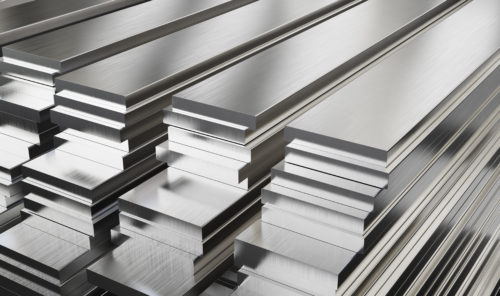Stainless Steel Advantages
Stainless steel is a metal used in various applications due to its durability, heat and corrosion resistance, and variety of grades and types. We will explore what stainless steel is and the different types of stainless steel while also describing the advantages of stainless steel in various applications.
What Is Stainless Steel?
Stainless steel is an alloy composed of varying amounts of manganese, silicon, chromium, and low-carbon steel. The chromium content in stainless steel provides lasting corrosion resistance in oxygenated environments and extreme temperatures and can deliver exceptional durability when hardened. While stainless steel is typically an alloy composed of the four components above, select grades add molybdenum and nickel to improve the corrosion resistance. While there are several compositions, for a steel alloy to be considered stainless steel, it must contain 10.5% chromium or more.
Various grades of stainless steel exist to deliver performance in a broad spectrum of applications. Additives in stainless steel alloy include:
- Carbon
- Copper
- Manganese
- Molybdenum
- Nickel
- Nitrogen
- Silicon
- Sulfur
Throughout the alloying process, manufacturers assess and measure the composition to create stainless steel with the desired properties.
Types of Stainless Steel
There are five primary types of stainless steel and various grades to choose from, with the 300 and 400 series being the most popular. The following five categories classify stainless steel:
- Austenitic: The most popular stainless steel type that improves formability and weldability with nitrogen, manganese, and nickel additives.
- Ferritic: A chromium-based, magnetic stainless steel used in limited applications with a carbon content of 0.10%.
- Duplex: A 50/50 combination of austenitic and ferritic stainless steel that offers resistance and strength but does not withstand welding well.
- Martensitic: A stainless steel type similar to ferritic steel that offers higher strength than ferritic but less resistance than austenitic steel due to its higher carbon content.
- Precipitation Hardening (PH): A stainless steel type with aluminum, niobium, and copper additives and exceptional strength due to an aging heat treatment.
Stainless Steel Benefits
Stainless steel offers various advantages that make it a preferred choice in many applications. Benefits of stainless steel include:
Strength
Stainless steel is a high-strength alloy. It can maintain strength at extremely low and high temperatures making it desirable for many applications.
Cleanliness
Stainless steel prohibits pathogen and bacterial growth and can be easily cleaned and maintained. It can be cleaned to a shiny finish with a swabbing and all-purpose cleaner, followed by polishing. Stainless steel’s low maintenance and ease of cleaning make it ideal for sanitary applications in kitchens and hospitals.
Aesthetics
Stainless steel has a sleek metallic appearance that works well with classic and modern aesthetics. Homeowners appreciate the beauty and functionality of stainless steel in their homes. Stainless steel is a preferred material for home items like appliances that can increase the value and appearance of the space.
Corrosion Resistance
Stainless steel has excellent resistance to water staining, rust, and corrosion. It can handle various environmental conditions with extreme temperatures and pressures. The corrosion resistance of stainless steel comes from the chromium content that creates a self-repairing barrier over the surface of the metal to resist corrosion, rust, and damage. Grades of stainless steel with increased molybdenum, titanium, and nickel content can enhance the alloy’s properties, including corrosion resistance.
Recyclability
Stainless steel is highly recyclable. After a stainless steel product has exceeded its lifespan, it can be recycled to make other stainless steel products. Most stainless steel products already contain recycled materials.
Durability
Stainless steel is one of the most durable metals used today. It can be made lightweight and maintain a high toughness to reduce buckling under heavy loads. Stainless steel can hold heavy weights in extreme environmental conditions, including high and low temperatures.
Applications of Stainless Steel
The following applications rely on stainless steel for its many advantages:
- Medical: Stainless steel is a primary component of forceps, needle holders, blades, clamps, and surgical knives used in medicine. Artificial valves and pacemakers to help the heart pump blood and beat rely on stainless steel. Parts made of stainless steel are used in critical healthcare machinery like stretchers, ECG, and EKG systems.
- Infrastructure: Aviation, marine, railway, and bridge construction applications rely on stainless steel for its corrosion-resistant properties. Many world economies depend on stainless steel infrastructure for its strength and corrosion resistance. It is also ideal for window and door frames, cladding, and roofing.
- Machinery: Stainless steel’s cryogenic and conductive properties make it the preferred alloy for ovens, tanks, and heat exchangers. Petrochemical, chemical, food pickling, and desalination plants rely on stainless steel machinery. Paper and pulp, off-shore oil and gas, and marine applications also rely on stainless steel components.
- Defense and Domestic: Stainless steel has been a primary material in defense since World War II due to its light weight and high tensile strength. Missiles, tank fasteners, and springs in artillery guns rely on stainless steel. It is also a primary material in domestic goods for daily life, including kitchen sinks, utensils, and vehicle fuel and exhaust lines. Domestic applications count for approximately 3/4 of modern stainless steel use.
Rely on APM Hexseal for Your Stainless Steel Manufacturing Solutions
Stainless steel is a preferred alloy for its durability at light weights, heat, weather, and corrosion resistance, and its ability to be made in various grades for the desired properties. APM Hexseal has been manufacturing stainless steel solutions for various industries for more than 60 years. Contact us or request a quote for your stainless steel solution today.


